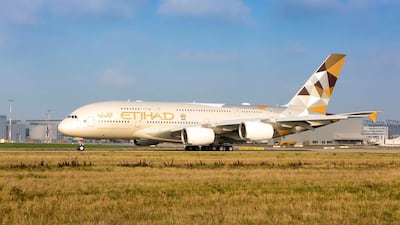Etihad Airways is in a better position to deal with industry-wide challenges at this stage of its five-year transformation plan, as it pursues a "back to basics" approach to business, its chief executive said.
While the spread of the coronavirus will have a "sizeable" impact on the global aviation industry, Etihad Airways now has the network flexibility to meet the anticipated surge in air travel demand from China once the outbreak is contained, Tony Douglas, group chief executive, told The National on Thursday.
Within the first two months of this year, the industry has faced challenges such as virus, a volcanic ash cloud in the Philippines, bush fires in Australia, the downing of a Ukrainian passenger jet by Iran and an ongoing political disruption in Hong Kong, demonstrating that"in the aviation sector, the only constant is variables", he said at the 17-year-old airline's headquarters in Abu Dhabi.
"If these things happened at the start of our transformation journey, I would suggest it would have made our life an awful lot more difficult," Mr Douglas said. "We anticipate there will be challenging headwinds in 2020, however that’s pretty much always the way aviation is. Will it get harder than normal? It might do. But we're thankful that the teenage [airline] had to sort itself out when it was 14, as opposed to when it was a big lumbering adult that was perhaps carrying too much weight ... when all of these things happen, all of a sudden they’re not as adaptive and agile."
Etihad narrowed its annual loss by 32 per cent to $870m last year, beating its own internal targets, as it made progress on its turnaround plan, it said on Thursday. Revenue dropped 5 per cent to $5.6bn. Since its restructuring began in 2017, the state-owned airline has overhauled its cost base, dropped unprofitable routes, cut jobs and restructured plane orders while focusing on point-to-point traffic.
Etihad, like global airlines, is dealing with a drop in air travel demand because of the coronavirus outbreak. The airline, which halted flights to mainlaind China and Hong Kong, on Wednesday said it asked its cabin crew to take paid leave in April rather than schedule it for later in the year.
The coronavirus "will have a sizeable impact [on Etihad], and it will have a sizeable impact for everybody," Mr Douglas said. However, travel demand "will come back and may come back strongly in some places", he added.
"How long and what is the profile of that goes back to: the only constant is the variables. Its almost about being comfortable with ambiguity, because people who search for false clarity where it doesn’t exist are now caught up in building a network around false assumptions," he said.
Once the virus, which first appeared in China and spread rapidly to more than 70 countries, is eventually contained, air travel demand from China will recover quickly.
"When China comes back online, the world’s biggest population, who've not been allowed to travel much for the last couple of months, will want to get out and about," he said. "Guaranteed, when [demand] comes back China will go off like a fire hydrant."
In 2019, the airline significantly cut direct operating costs by 11 per cent, or $650m, helped by lower jet fuel costs. Yields rose by 1 per cent, driven by capacity reduction and growing market share in premium and point-to-point markets. Seat load factors rose to 78.7 per cent, from 76.4 per cent in 2018.
Etihad, which recorded its fourth consecutive annual loss, said its narrowed deficit in 2019 - from $1.298bn in 2018 - beat its own internal targets, dropping "well over" $100m more than planned, the CEO said.
"It's about going back to basics, there's no rocket science," Mr Douglas said. "You can't smoke and mirrors that, it's hard, tangible action."
Asked about the main priorities left to tackle under the remainder of the transformation programme, Mr Douglas said 750 projects aimed at reducing cost and driving revenue have been identified that are under various stages of completion.
The airline is "reviewing and actively re-designing" its lease structures and debt sources, he said. Continuing to deliver on those 750 projects, targeting point-to-point markets and further reducing its fleet mix are among its goals. The airline phased out its Airbus A330s, making Boeing 787s the backbone of its fleet.
"We will return a bit to growth this year and next year," Mr Douglas said, referring to Available Seat Kilometres, an industry metric that refers to passenger-carrying capacity.
A "key part" of its plans is the new low-cost carrier with Air Arabia launching in the second quarter and expecting to announce its destinations in a few weeks, he said. The JV will function independently, complementing Etihad’s network of routes from Abu Dhabi, the airline said.
Etihad said its cumulative core operating performance improved by 55 per cent since 2017.
This entailed "dramatically changing" its fleet composition by retiring A340s, A330s, and restructuring plane orders so that the network drives the aircraft requirement and not vice versa, he said.
"What we’ve not been doing is chasing a map that says Etihad flies to all these places—unless it makes sustainable, economic sense," he said.
Etihad also carried out a "seat densification" programme, adding 22 seats on its Airbus A320 and A321s, thereby increasing yield with the same number of aircraft.
It also re-negotiated terms with all its suppliers from Boeing, Airbus, GE and Rolls Royce down to the bottles of water served onboard.
"We renegotiated just about everything in terms of cost, future commitments and greater flexibility -- that has massive benefit to us."


